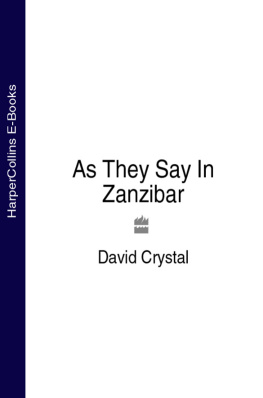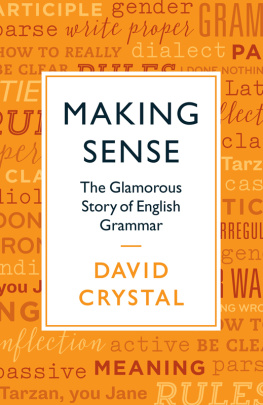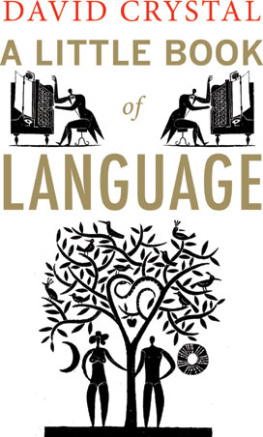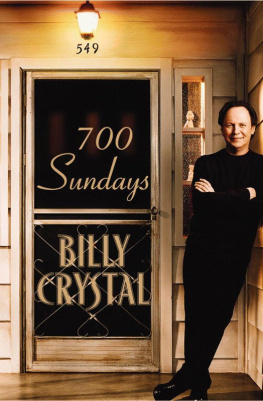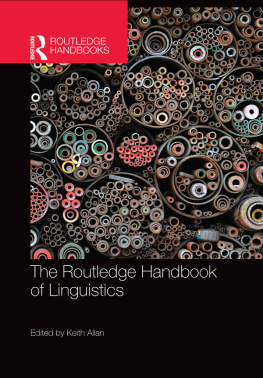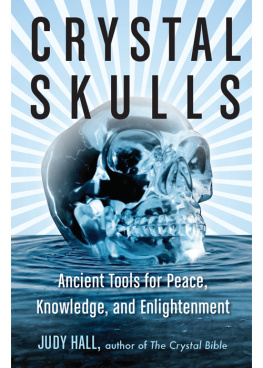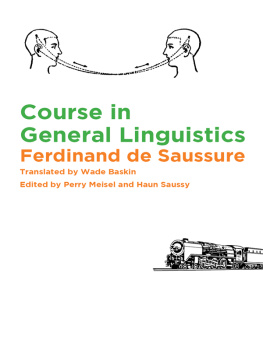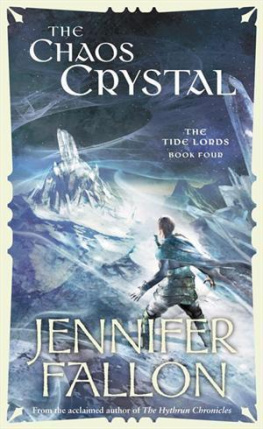Crystal - Internet Linguistics
Here you can read online Crystal - Internet Linguistics full text of the book (entire story) in english for free. Download pdf and epub, get meaning, cover and reviews about this ebook. publisher: Taylor & Francis, genre: Home and family. Description of the work, (preface) as well as reviews are available. Best literature library LitArk.com created for fans of good reading and offers a wide selection of genres:
Romance novel
Science fiction
Adventure
Detective
Science
History
Home and family
Prose
Art
Politics
Computer
Non-fiction
Religion
Business
Children
Humor
Choose a favorite category and find really read worthwhile books. Enjoy immersion in the world of imagination, feel the emotions of the characters or learn something new for yourself, make an fascinating discovery.
- Book:Internet Linguistics
- Author:
- Publisher:Taylor & Francis
- Genre:
- Rating:3 / 5
- Favourites:Add to favourites
- Your mark:
- 60
- 1
- 2
- 3
- 4
- 5
Internet Linguistics: summary, description and annotation
We offer to read an annotation, description, summary or preface (depends on what the author of the book "Internet Linguistics" wrote himself). If you haven't found the necessary information about the book — write in the comments, we will try to find it.
Internet Linguistics — read online for free the complete book (whole text) full work
Below is the text of the book, divided by pages. System saving the place of the last page read, allows you to conveniently read the book "Internet Linguistics" online for free, without having to search again every time where you left off. Put a bookmark, and you can go to the page where you finished reading at any time.
Font size:
Interval:
Bookmark:
Internet Linguistics
The Internet is now an integral part of contemporary life, and linguists are increasingly studying its influence on language. In this student-friendly guidebook, leading language authority Professor David Crystal follows on from his landmark bestseller Language and the Internet and presents the area as a new field: Internet linguistics.
In his engaging trademark style, Crystal addresses the online linguistic issues that affect us on a daily basis, incorporating real-life examples drawn from his own studies and personal involvement with Internet companies. He provides new linguistic analyses of Twitter, Internet security, and online advertising, explores the evolving multilingual character of the Internet, and offers illuminating observations about a wide range of online behaviour, from spam to exclamation marks.
Including many activities and suggestions for further research, this is the essential introduction to a critical new field for students of all levels of English language, linguistics and new media.
David Crystal is a freelance writer, lecturer and broadcaster, based in Holyhead, North Wales. He is author of numerous books including Just a Phrase Im Going Through (Routledge 2009). The first Routledge David Crystal Lectures DVD, The Future of Language, was published in 2009.
Crystal draws on his wealth of expertise to shed light on the important issues related to language form and use online.
Mark Warschauer, University of California, Irvine, USA
David Crystal is a master linguist and master teacher. Given his expertise on language and the internet, he is the ideal author for this student text.
Naomi S. Baron, American University, USA
Crystal provides a unique overview of authentic applications for linguistics on the internet and the methodological issues raised in the case-studies will be relevant for a wide range of projects that readers may be working on. This will become essential reading for students in this area.
Charlotte Taylor, University of Portsmouth, UK
Internet Linguistics: A Student Guide
David Crystal

First published 2011
by Routledge
2 Park Square, Milton Park, Abingdon, Oxon OX14 4RN
Simultaneously published in the USA and Canada
by Routledge
270 Madison Avenue, New York, NY 10016
Routledge is an imprint of the Taylor & Francis Group, an informa business
2011 David Crystal
The right of David Crystal to be identified as author of this work has been asserted by him in accordance with sections 77 and 78 of the Copyright, Designs and Patents Act 1988.
Typeset in Sabon and Scala by
Swales & Willis Ltd, Exeter, Devon
Printed and bound in Great Britain by
TJ International Ltd, Padstow, Cornwall
All rights reserved. No part of this book may be reprinted or reproduced or utilized in any form or by any electronic, mechanical, or other means, now known or hereafter invented, including photocopying and recording, or in any information storage or retrieval system, without permission in writing from the publishers.
British Library Cataloguing in Publication Data
A catalogue record for this book is available from the British Library
Library of Congress Cataloging in Publication Data
Crystal, David, 1941
Internet linguistics : a student guide / David Crystal.
p. cm.
Includes index.
1. Computational linguistics. 2. Internet. 3. InternetSocial aspects. I. Title.
P98.5.I57C75 2011
004.601'4dc22
2010034571
ISBN 13: 978-0-415-60268-6 (hbk)
ISBN 13: 978-0-415-60271-6 (pbk)
ISBN 13: 978-0-203-83090-1 (ebk)
PREFACE
How does one write a student guide to a subject that does not exist or, at least, does not yet exist in such a recognized form that it appears routinely as a course in university syllabuses or as a chapter in anthologies of linguistics? Inevitably, it will be something of a personal account, informed by the various Internet projects with which I have been involved. The situation reminds me of the 1980s, when pragmatics was evolving as a field of study, and the various published introductions differed widely in their subject-matter. Internet linguistics is at that inchoate stage now. I can easily imagine other introductions to the subject written perhaps by someone with a background in computational linguistics which would look very different from this one. My background is in descriptive linguistics, and it shows. But it is an appropriate background to have, for the one thing Internet language needs, more than anything else, is good descriptions.
A growing number of linguistics students, at undergraduate and postgraduate levels, are now beginning to study the subject, and I have written this book primarily for them. It will I hope also be of interest to those who are taking a language course as part of a degree in media or communication studies. I have assumed that readers have completed an introductory course in linguistics, or at least read an introduction to the subject, and are familiar with the various domains that constitute the Internet, including the most recent developments. They will not find here an exposition of syntax or sociolinguistics, or of blogging or social networking. It is an account written for people who are comfortable with the basic tenets and methods of linguistics, well versed in Internet activities, and curious about the relationship between the two. It is also for those, within this population, who are fascinated by the way Internet language is evolving, and want to research it. I have therefore given as many pointers as I could to topics where research is needed. My aim is not just to inform but to inspire more linguists to work in this field, for, as will become apparent and surprising as it may seem the subject is urgently in need of them. In particular, I have illustrated my points almost entirely from English, and this limitation needs to be overcome if the conclusions are to be robust.
This book is very different from my Language and the Internet. The emphasis in that work was on the stylistic diversity of the medium, so there was a focus on the linguistic features which identify language varieties. In the present book, general issues of characterization and methodology take centre stage. The descriptive chapter on Twitter would not have been out of place in the earlier book, but in other respects Internet linguistics tries to live up to its title and provide a wider perspective which Language and the Internet lacked. A certain amount of overlap has been inevitable, but I hope it is not intrusive.
My thanks are due to those who reviewed this text on behalf of the publisher, and also to Sacha Carton, Ian Saunders, and others in the companies (AND, Crystal Semantics, Adpepper Media) with whom I have had the opportunity to develop the approaches described in Chapter 6. Above all, I owe an enormous debt of gratitude to my wife and business partner Hilary, who has shared my close encounter with the Internet, professionally and privately, over the past 20 years.
David Crystal
July 2010

Linguistic Perspectives
Wherever we find language, we find linguists. That is what linguists are for: to seek out, describe, and analyse manifestations of language everywhere. So when we encounter the largest database of language the world has ever seen, we would expect to find linguists exploring it, to see what is going on. It has begun to happen. And a new field is emerging as a consequence: Internet linguistics.
Next pageFont size:
Interval:
Bookmark:
Similar books «Internet Linguistics»
Look at similar books to Internet Linguistics. We have selected literature similar in name and meaning in the hope of providing readers with more options to find new, interesting, not yet read works.
Discussion, reviews of the book Internet Linguistics and just readers' own opinions. Leave your comments, write what you think about the work, its meaning or the main characters. Specify what exactly you liked and what you didn't like, and why you think so.


